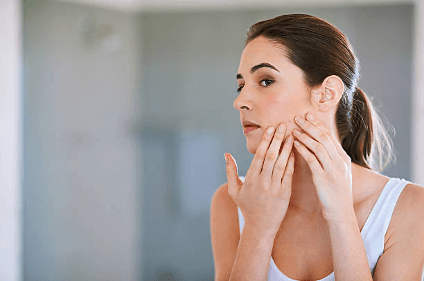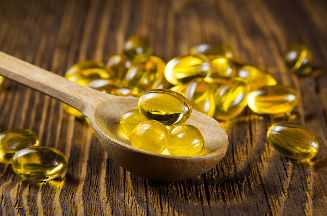Introduction
Popularly known as ‘the sunshine vitamin’, Vitamin D is an essential nutrient for the vitality and well-being of our body.
Vitamin D plays a crucial role in our bodily functions including teeth and bone health, muscle activities, inflammation control, and immune responses. As more is known of its extensive effects on the body, vitamin D is increasingly regarded as a hormone or prohormone, and not just an ordinary vitamin (1).

There is a growing interest in the use of vitamin D and its analogs as supplements or therapeutic agents for health conditions (2). The sunshine vitamin has been particularly considered in the treatment of many skin diseases like acne and atopic dermatitis.
In this article, we summarize for you the current evidence, benefits, and the proper way of using vitamin D in the treatment of acne.
Understanding Acne better
Acne vulgaris, or acne for short, is a chronic inflammatory condition of the skin or skin pores. It manifests as unpleasant reddish inflamed bumps on the face, neck, and back, leading to scarring and hyperpigmentation (3).
Acne affects about 85% of adolescents and young adults worldwide (4), although it may also affect older adults. Acne can be a source of cosmetic and psychological concern for patients, as many seek multiple information sources and therapeutic alternatives for their care.
Acne may result from a number of factors. Current evidence identifies four main mechanisms by which acne lesions occur (3). These include:
- Excessive secretion and clogging of hair follicles (skin pores) by sebum.
- Overproduction and deposition of keratin by keratinocytes thereby blocking and inflaming the hair follicle.
-
Infection of the hair follicle by the bacterium,
Propionibacterium acne or Staphylococcus aureus,
thereby triggering inflammation.
- Inflammation and immune system flares.
Any of these events can be triggered by either one or a combination of genetic, diet, and environmental factors (5). Accordingly, treatment approaches and medications for acne aim at altering this chain of events in the patient’s skin, especially the inflammatory processes (5).
Can a lack of Vitamin D cause Acne? – what current science says.
Vitamin D is a fat-soluble vitamin that is produced in the skin from cholesterol when it is exposed to UVB sun rays (6). It may be found in the body as cholecalciferol, 25-hydroxyvitamin D (25(OH)D) or calcifediol, and/or in its activated form, calcitriol, where it modulates calcium balance as well as inflammatory and immune responses among other functions.

Vitamin D has been linked with a significant number of inflammatory skin conditions like psoriasis, acne, atopic dermatitis, vitiligo, and alopecia (7). In particular, the pathogenesis of acne is strongly connected with Vitamin D.
For one, there is a large body of evidence that vitamin D insufficiency or deficiency is prevalent among people with acne (8). Some studies have shown that the severity of acne inflammation may even be correlated to the degree of vitamin D insufficiency in the patients (8).
In a 2021 meta-analysis of studies comparing a total of 918 acne patients against 814 controls, the scientists found that the level of 25-hydroxyvitamin D [25(OH)D] in the serum of acne patients is significantly lower relative to that of the healthy controls (9).
The vitamin D deficiency-acne hypothesis is also being proven progressively in clinical trials using vitamin D supplementation in acne treatment.
In a 2016 randomized controlled trial (10), the serum 25(OH)D levels were significantly lower in the acne patient group compared to the placebo group. Following an 8-week supplementation with vitamin D (1000 IU/day), the investigators noted a 34.6% decrease in new lesions breakouts in the patient group compared to the placebo group. Serum analysis also revealed an improved level of serum 25(OH)D in the treatment group.
Similarly, in a 2020 study, patients in the treatment group who received an active Vitamin D analog, alfacalcidol (0.25ug daily), showed increased serum levels of 25(OH)D, decreased inflammatory cytokine levels, and overall better clinical outcomes compared to their baseline. The control group did not show significant changes in baseline parameters. This was thought to be because they had no prior vitamin D deficiency, and hence, it was believed that vitamin D supplementation would improve acne only in patients that are deficient in the vitamin. (11)
Nevertheless, more large-scale controlled trials are required to substantiate these findings and further establish the benefits of vitamin D in acne treatment.
Benefits of Vitamin D in the Treatment of Acne

If you are considering adding vitamin D to your skincare shelf for anti-acne, you may want to know more about some of its properties that are responsible for its anti-acne effect. Here are some of them:
1.
Antiinflammatory action
The immunomodulatory effect of Vitamin D may help stem the tide of inflammatory mediators in the skin and acne lesions.
In past studies, researchers have established that sebum-producing cells in the skin (sebocytes) express vitamin D receptors (VDRs) through which vitamin D may modulate sebum production and overall sebocyte functions (12). Studies have also suggested that the activation of the VDRs may play a role in offsetting the inflammatory and immune responses triggered by
P. acne
in infected sebaceous follicles (7, 12).
2.
Antibacterial properties
Vitamin D has also been found to exhibit strong systemic antimicrobial activity against some common pathogens involved in acne like
P. acne
and
S. aureus
(13). This clears the sebaceous glands of their infections and prevents the inflammation of the hair follicle and acne occurrence.
3.
Anti-comedogenic effect
Vitamin D has shown a significant impact in modulating the growth and functions of keratinocytes in hair follicles. By this, it inhibits the excessive deposition of keratin that may lead to the clogging of skin pores and comedo (blackheads) formation (7).
4.
Antioxidant effect
Oxidative damage to skin structures following acne inflammation causes scar formation and hyperpigmentation in the affected parts. Free radicals may also be generated by stress, infections, or poor diet signals in the body.
Vitamin D has been shown to possess significant antioxidant activity. In a 2019 meta-analysis, vitamin D supplementation was shown to improve the total systemic antioxidant capacity. The levels of intrinsic antioxidant molecules like glutathione and nitric oxide were significantly increased while the levels of oxidative stress markers, like malondialdehyde, were significantly reduced (14).
How to Use Vitamin D in Acne Care
Here are the best ways to get the full benefits from vitamin D in treating acne and improving your skin health.
1.
Consume vitamin D-rich foods
Even though this vitamin can be synthesized in our skin when exposed to sunlight, foods rich in vitamin D remain the best bet to getting the recommended daily amount of this nutrient to avoid deficiency. The growing sedentary lifestyle, being of darker skin tone, and living in Northern latitude areas with insufficient sunlight in the winter are good reasons to ensure adequate dietary intake of vitamin D.
According to the NIH, the Recommended Dietary Allowance (RDA) of vitamin D for adults 19 years and older is 600 IU (15 mcg) daily, and for elderly people >70 years, it is 800 IU (20 mcg) daily (15).
Food sources offer two forms of vitamin D — Vitamin D2 (ergocalciferol found in plant sources) and Vitamin D3 (cholecalciferol, found in animals). Natural rich food sources of vitamin D include (15):
- Fatty fishes e.g. Herring, Salmon, Tuna Fish, Sardines
- Eggs
- Meat
- Liver
- Mushroom
- Soy milk
- Oat
- Ready-to-eat cereals and other vitamin-D-fortified foods
Note: Milk and Cheese are also rich sources of vitamin D. However, eat them with caution as some research suggests that dairy products may likely worsen acne as they might increase sebum production.
2.
Get a healthy amount of sunshine
Are you aware that if you get sunlight only in a sunny office or while driving, you are still
unlikely
to get vitamin D synthesized in your skin?
This is because window glasses completely block out UVB radiation needed to produce vitamin D in our skin.
This means that sometimes, you have got to go out wearing partly-covering clothes to get adequate sunshine. Getting adequate sunshine will not treat your acne directly, but it will improve your vitamin D levels and the outcomes of treatment. However, on other days, put on sunscreen with adequate SPF when going outdoors to prevent sunburn and other skin damage.
3.
Take Vitamin D supplements

The larger majority of people worldwide consume less than the recommended daily intake of vitamin D (16). Taking vitamin D supplements may go a long way in correcting this deficiency.
Commercially available vitamin D supplements feature ergocalciferol or cholecalciferol in capsule forms for oral use. Some experts suggest that cholecalciferol may be superior to ergocalciferol in raising the 25(OH) D levels. Ergocalciferol is sometimes preferred by people following vegan diets. But any of the two will get the job done.
4.
Topical vitamin D
Some evidence indicates that vitamin D can be safely and effectively delivered through the skin (17). It is hypothesized that its anti-inflammatory and antimicrobial activities will be beneficial in the topical treatment of acne.
Precautions
The upper limit recommended for vitamin D supplementation is 4000 IU (100 mcg) daily (16). Although toxicity from vitamin D is rare, taking more than the RDA for a long time can result in hypercalcemia which can be life-threatening.
Bottom Line
Evidence suggests that vitamin D deficiency may be connected with acne development and severity. Obtaining vitamin D through a proper diet, adequate sunshine, supplements, and topical agents may be beneficial in the treatment of acne.
Frequently asked questions
Is vitamin D good for acne?
There is good evidence that a lack of vitamin D may cause or worsen acne. Taking VitD supplementation in such cases may be beneficial for acne treatment.
Can taking vitamin D clear my skin?
Yes, in cases of vitamin D deficiency. However, it may be better to opt for products containing vitamins A, D, E, and Zinc, all of which are good for the skin.
How Long Does It Take for Vitamin D to Work?
This may depend on your initial levels of vitamin D. However, with 1-2 months of consistent vitamin D supplementation, you should notice the remission of symptoms of vitamin D deficiency.
References
-
Ellison DL, Moran HR. Vitamin D: Vitamin or Hormone? Nurs Clin North Am. 2021;56(1):47-57.
https://doi.org/10.1016/j.cnur.2020.10.004
-
Alaraj M, Alenazi FS, Hassan D, Hossain A. Vitamin D as a drug: new therapeutic approaches. Pharmacia. 2022. 69(3): 765-770.
https://doi.org/10.3897/pharmacia.69.e85057
-
Bhat YJ, Latief I, Hassan I. Update on etiopathogenesis and treatment of Acne. Indian J Dermatol Venereol Leprol 2017;83:298-306.
https://doi.org/10.4103/0378-6323.199581
-
Ruba M. Jaber, Basma M. Alnshash, Suzan N. Mousa, et al. Epidemiology of Acne Vulgaris among Adolescents and Young Adults in Jordan University Hospital. Open J of Nursing, 2020: Vol.10 No.4.
https://doi.org/10.4236/ojn.2020.104024
-
Cong TX, Hao D Wen X, et al. From pathogenesis of acne vulgaris to antiacne agents. Clin Aesthet Dermatol. 2013;6(9):2735.
https://doi.org/10.1007/s00403-019-01908-x
-
Harvard School of Public Health. Vitamin D. The Nutrition Source. [online]. Available:
https://www.hsph.harvard.edu/nutritionsource/vitamin-d/
. Accessed: 11 Mar 23 -
Yildizgören MT, Togral AK. Preliminary evidence for vitamin D deficiency in nodulocystic acne. Dermatoendocrinol. 2015;6(1):e983687.
https://doi.org/10.4161%2Fderm.29799
-
Alhetheli, G., Elneam, A. I. A., Alsenaid, A., & Al-Dhubaibi, M. (2020). Vitamin D Levels in Patients with and without Acne and Its Relation to Acne Severity: A Case-Control Study. Clinical, cosmetic and investigational dermatology, 13, 759–765.
https://doi.org/10.2147/CCID.S271500
. -
Wang M, Zhou Y, Yan Y. Vitamin D status and efficacy of vitamin D supplementation in acne patients: A systematic review and meta-analysis. J Cosmet Dermatol. 2021;20(12):3802-3807.
https://doi.org/10.1111/jocd.14057
-
Lim SK, Ha JM, Lee YH, et al. Comparison of vitamin D levels in patients with and without acne: a case-control study combined with a randomized controlled trial. PLoS One. 2016;11(8):e0161162.
https://doi.org/10.1371/journal.pone.0161162
-
Ahmed Mohamed A, Salah Ahmed EM, Abde-Aziz RTA, et al. The impact of active vitamin D administration on the clinical outcomes of acne vulgaris. J Dermatolog Treat. 2020;1-6.
https://pubmed.ncbi.nlm.nih.gov/31868550/
-
Reichrath J, Zouboulis CC, Vogt T, Holick MF. Targeting the vitamin D endocrine system (VDES) for the management of inflammatory and malignant skin diseases: An historical view and outlook. Rev Endocr Metab Disord. 2016;17(3):405-417.
https://doi.org/10.1007/s11154-016-9353-4
-
Youssef DA, Miller CW, El-Abbassi AM, et al. Antimicrobial implications of vitamin D. Dermatoendocrinol. 2011;3(4):220-229. doi:10.4161/derm.3.4.15027.
https://doi.org/10.4161/derm.3.4.15027
-
Mahdi Sepidarkish, Farnaz Farsi, Maryam Akbari-Fakhrabadi, et al. The effect of vitamin D supplementation on oxidative stress parameters: A systematic review and meta-analysis of clinical trials. Pharmacological Research. 2019: 139; 141-145.
https://doi.org/10.1016/j.phrs.2018.11.011
-
NIH ODS. Vitamin D. Factsheet for Professionals. Available.
https://ods.od.nih.gov/factsheets/VitaminD-HealthProfessional/
-
IOM (Institute of Medicine). Dietary Reference Intakes for Calcium and Vitamin D. Washington DC: The National Academies Press; 2011
https://nap.nationalacademies.org/catalog/13050/dietary-reference-intakes-for-calcium-and-vitamin-d
-
Sadat-Ali M, Bubshait DA, Al-Turki HA, Al-Dakheel DA, Al-Olayani WS. Topical delivery of vitamin d3: a randomized controlled pilot study. Int J Biomed Sci. 2014;10(1):21-24.
http://www.ncbi.nlm.nih.gov/pmc/articles/pmc3976443/

 By myulikeadmin
By myulikeadmin




